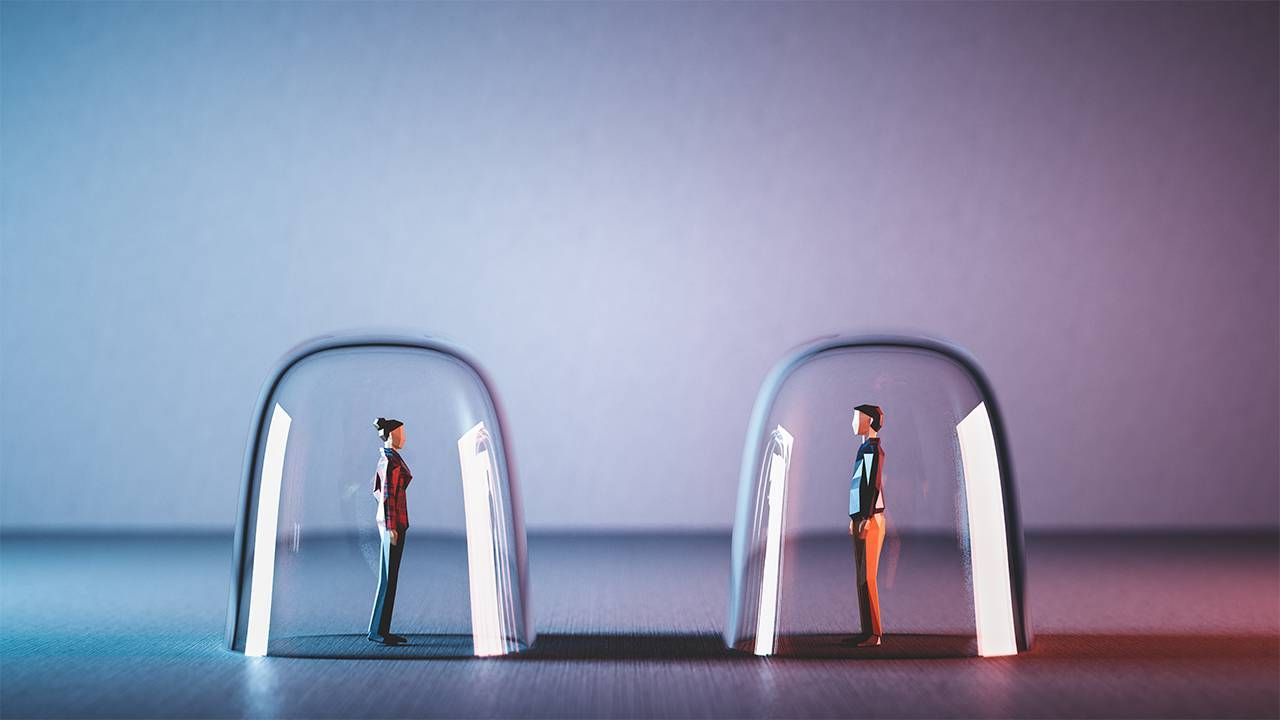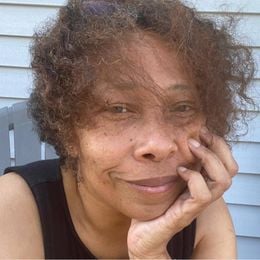Coping With the Stress of Pandemic 2.0
As COVID-19's delta variant has impacted the return to 'normal,' here are suggestions on how to handle setbacks and fear
Each April, I take my younger daughter on a trip to Raleigh, N.C. for her birthday. We dine on French food and visit the North Carolina Museum of Art. We also have a house party with friends.
Due to the COVID-19 pandemic, the 2020 shindig was a bust. But in spring 2021, more people received their vaccinations, the world crept toward normal and Mackenzie and I fumbled through packing (we didn't remember how).

As everybody began arriving for the party, I thought "seven people and three dogs in a room is a lot." Sweat trickled down my spine. Then three more people walked in, which was when I hyperventilated, spiraling into a screaming/shaking/crying panic attack right in front of everyone.
"There are too many people," I said while sobbing and gasping for air. "It's too much."
I sat in a dark room for a long while before venturing back out, hoping my daughter wasn't too embarrassed.
The anticipated freedom has instead been a dread of socializing.
A quick run through social media these days probably shows gatherings of family and friends, unmasked, joyful, hugging. You know: normal.
But after this time of social distancing, masks, DoorDash, hand sanitizer, ventilators, DEATH and Zoom, it can be terrifying to be out in the world, masked or not, vaccinated or not. The anticipated freedom has instead been a dread of socializing. Who coughed? Why is everybody standing close? Can't we Zoom this meeting?
"Cave syndrome," it turns out, is a thing, according to Dr. Thaddeus Bell, a family physician who practices in Charleston, S.C. and is founder of the nonprofit Closing the Gap in Healthcare. And while the term "cave syndrome" is recently coined, the phenomenon isn't new.
"We noticed this in American-Japanese citizens who were forced to be rounded up and put in a designated area after the Japanese bombed Pearl Harbor," Bell said. "And the U.S. retaliated and they forced American-Japanese citizens to stay in [internment camps] for [several years]."
The Challenges of Cave Syndrome
"A lot of those people who tried to integrate back into society simply couldn't," Bell explained. "Cave syndrome is like that, where people have trouble normalizing what has become 'not' normal."
Cave syndrome, not an officially recognized diagnosis, nonetheless is a phenomenon that health workers noticed as the world began to emerge from isolation. Coined by psychiatrist Arthur Bregman of Coral Gables, Fla., the term describes what Bregman also recognized as a pattern: a debilitating fear of venturing out.
In May 2020, University of British Columbia researchers published a study in the journal Anxiety predicting that, based on statistics gathered after natural disasters, about 10% of people who have lived through the pandemic will develop COVID stress syndrome, for any number of reasons.
Some will have experienced illness from COVID-19 themselves or the deaths of friends and loved ones. Some could have experienced isolation and deep loneliness, bankruptcy or financial hardships, job loss or home foreclosure.
Relationships could have unraveled. But even after the lessening of stress — as vaccinations were developed and administered, and the infections began to decrease — learned behaviors remained.
"I have noticed, even in my office, you don't have to ask patients to isolate themselves," Bell said. "They do it automatically. We probably are going to see this in many people, some of them for the rest of their life."
But "normal" is a siren's call. And it is summer. So, as vaccinations increased, and the weather warmed, Atlanta resident Meg Cocroft decided that a change of scenery would be good for her, her college-aged daughter and her son who was in middle school.
"We'd all been fully vaccinated for several weeks, and when things were looking up, we decided we needed to do a trip," Cocroft said of their vacation to Jekyll Island, Ga.
'Back to My Bubble'
In June, however, COVID-19 numbers began rising as the trip grew closer. "I got nervous," Cocroft admitted. "But my daughter's a student at Emory University, and she said, 'It's a new hotel, there's lots of patios, lots of space. Chill.'"
Cocroft's experience was anything but laid back.
"I go to check in [at the hotel], and there's not one person with a mask on. I was the only one," she said. "Throughout the weekend, we had our masks on, and nobody else did. And you get those looks."
The looks were unsettling, but Cocroft "was itching for somebody to say something."
She developed a plan. "I was going say that 'I work in a doctor's office, and he wants us to mask.' Nobody ever confronted us, but I couldn't relax. I just kept thinking 'this was too soon.'"
"Get me back to my midtown Atlanta bubble," is what she thought, she said.
"The concern about [others] not being vaccinated is worse when you start thinking about the variant."
Florida resident Jed Dillard also found safety in his bubble.
"We live in the woods, in north Florida, about 25 miles from Tallahassee," Dillard said. "We're kinda used to being on the porch."
He and his wife, Joan Hare, both of whom were retired at the beginning of lockdown, still made mental adjustments to isolation. It was a sense of "we can't go anywhere," and vaccinations were a while away.
The Dillards had their pod — two friends who visited upon occasion. When they needed a roof replacement, the work crew stayed distanced and the couple felt safe.
Dillard's sister-in-law, however, contracted COVID-19 after going to the hospital to get treatment for a cat scratch. Dillard says the nurse who hooked up the IV had a cough, so when his sister-in-law began feeling ill, she called the hospital. She was told that the nurse "went home sick yesterday."
As Dillard and his wife talked by phone with his sister-in-law, they thought of his mother, who had died of pneumonia. "We were in a spiral," he said. "It exacerbated that we have to be careful who we're around."
Getting vaccinated reassured them somewhat. "Paranoia might be an overstatement, but we had a fear of going out … it was gradual," Dillard said.
And, Dillard says, there remains a sense of foreboding, largely because the rise of the delta variant of COVID-19. The Centers for Disease Control (CDC) says the variant can be spread by those who are vaccinated but have breakthrough symptoms and is "as contagious as chicken pox."
In late July, due to the increase in delta variant infections and breakthrough COVID-19 symptoms, the CDC reversed its suggestions for masking, encouraging all — vaccinated or not — to wear masks when indoors. The federal government is requiring all employees to become vaccinated or submit to repeated testing, as are several states.
"I'm thinking 'Let's go back.' The concern about [others] not being vaccinated is worse when you start thinking about the variant," Dillard says.
Pandemic 2.0?
Pandemic 2.0? Maybe, says Dr. Angela Marett Butler, a licensed clinical psychologist in Winchester, Va.
"As I am debating how to open back up my business and what trips to take, there seems to be a foreboding sense that things may all get shut down again," she said.
It's not unfair, she said, to compare the pandemic and its effects to other large-scale traumatic events.
"One day a few months after 9/11," Butler said, "[I heard] a car backfire, and everyone on the street dropped down on the sidewalk. I feel like a lot of folks will be hyper-vigilant about crowds, shaking hands, someone sneezing."
One of the variables in adapting to re-emergence "will be how much the pandemic impacted their lives, if they got really sick or lost a loved one, " Butler said.
Bell agrees, and adds that, particularly for African Americans, the disparity in social issues that came into sharp focus with the deaths of Ahmaud Arbery, Breonna Taylor and George Floyd, and the following unrest, also influenced comfort levels outside of the home.
Don't Forget Self-Care
There are ways to fight the struggle.
"Seek out professional help," Bell said. "People can start with their primary care physician."
Bell also urges families to pay attention to children's (or grandchildren's) behaviors, stressing that attempting to deal with a child's (or anybody's) mental stress alone could be disastrous.
"Practically, basic self-care such as eating well, sleeping well, exercising and having routines are more important than ever," Butler said. "For parents, it is so important to normalize and honor their children's feelings, but also to model working through the anxiety."
And take baby steps, she said. FaceTime for wine instead of going out together, have one friend over instead of five. "I think," Butler said, "that another benefit of the pandemic is we can all get 'do-overs' in our relationships and the ways we choose to spend our time."
But "first and foremost is compassion for ourselves and each other. Show some grace. Then, take time to decide what's important or valuable to you or your family and do those things," she said.
And … seek joy.
"Laugh when you can, with your family, with your friend, at a TikTok, at yourself, your pet — anything," Butler said.


